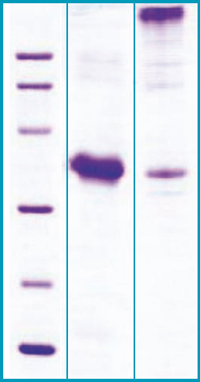Type
Recombinant protein
Description
Total 248 AA. MW: 28 kDa (calculated). UniProtKB acc.no. O14793. 243 AA of recombinant human Myostatin Propeptide and 5 extra AA (2 AA N-terminal, 3 AA C-terminal).
Amino Acid Sequence
MGNENSEQKENVEKEGLCNACTWRQNTKSSRIEAIKIQILSKLRLETAPNISKDVIRQLLPKAPPLRELIDQYDVQRDDSSDGSLEDDDYHATTETIITMPTESDFLMQVDGKPKCCFFKFSSKIQYNKVVKAQLWIYLRPVETPTTVFVQILRLIKPMKDGTRYTGIRSLKLDMNPGTGIWQSIDVKTVLQNWLKQPESNLGIEIKALDENGHDLAVTFPGPGEDGLNPFLEVKVTDTPKRSRRKLN
Source
E. coli
Purity
˃ 90 % by SDS-PAGE
SDS-PAGE Gel
12% SDS-PAGE separation of Human Myostatin Propeptide
1. M.W. marker – 14, 21, 31, 45, 66, 97 kDa
2. reduced and heated sample, 7μg/lane
3. non-reduced and non-heated sample, 7μg/lane
Endotoxin
< 1.0 EU/µg
Formulation
Filtered (0,4 μm) and lyophilized in 0.5 mg/mL in 20mM TRIS, 50mM NaCl, pH 8.0
Reconstitution
Add deionized water to prepare a working stock solution of approximately 0.5 mg/mL and let the lyophilized pellet dissolve completely.
Applications
Western blotting, ELISA
Shipping
At ambient temperature. Upon receipt, store the product at the temperature recommended below.
Storage/Expiration
Store the lyophilized protein at -80 °C. Lyophilized protein remains stable until the expiry date when stored at -80 °C. Aliquot reconstituted protein to avoid repeated freezing/thawing cycles and store at -80 °C for long term storage. Reconstituted protein can be stored at 4 °C for a week.
Quality Control Test
BCA to determine quantity of the protein.
SDS PAGE to determine purity of the protein.
Endotoxin level determination.
Note
This product is intended for research use only.

